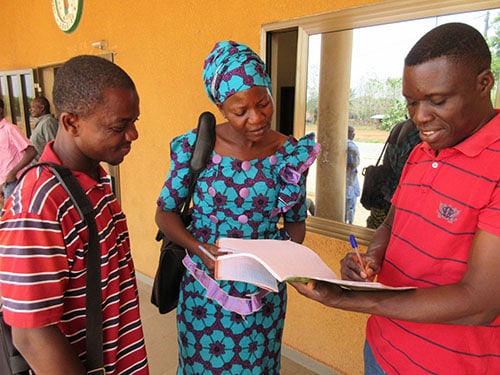Reaching Across Borders in Benin
August 7, 2017

Ground crossing at Togo border post. Photo: Tohoun Aplahoue
Standing near the border crossing between Benin and Togo, a recent graduate of Benin’s Field Epidemiology Training Program-Frontline course (FETP-Frontline) – which trains disease detectives in Benin – stopped briefly outside a building to exchange contact information with her Togolese counterpart. To the untrained eye, this small gesture might have gone unnoticed, but it meant so much more than it appeared.
At that moment, the region was facing a Lassa fever outbreak. Four cases had been identified, and the disease was crossing borders, affecting not only Benin, but also neighboring Togo, Burkina Faso, and Nigeria.
Facing Threats Together

Sharing contact information across borders.
Photo: Tohoun Aplahoue
In western Africa, countries are working together to determine the best ways to catch diseases at the busy checkpoints and along the porous borders where people come and go. This is especially critical in a country like Benin, whose geography connects it to its neighbors in long swaths from north to south, and where people are constantly on the move. It’s all too easy for an outbreak to slip in and take hold unnoticed.
In Benin, public health leaders are taking this threat seriously, and CDC is working alongside them to help. To get ahead of disease, we must look at how people connect with each other, where they go, and what they do when they get there. This way, when an outbreak happens, we know where to begin looking for more cases. Piecing together this kind of information yields clues, and those clues lead to action that saves lives. It’s all part of a process called cross-border surveillance, and it’s one of the things CDC is training the country’s FETP-Frontline participants to do.
Disease Detectives Learn to Connect
Around the world, CDC works with ministries of health to establish FETPs and train cohorts of disease detectives – experts who know how to monitor and analyze public health surveillance data, and who have the skills to track and respond to outbreaks before they become epidemics. So far, Benin’s FETP-Frontline has put 48 disease detectives into the field, ensuring that each of the border communes, or districts, has at least one graduate.
Because of Benin’s unique situation, CDC incorporated a specific module on cross-border surveillance into Benin’s FETP-Frontline curriculum. The module helps participants understand that the most important part of keeping safe borders is coordination – surveillance and response efforts must include working with neighboring countries to stop the spread of diseases.
When the recently trained disease detective from Benin reached out to connect with her neighbor, it was a clear signal that the lessons are taking hold and that participants are putting training into action in the global effort to stop outbreaks before they spiral out of control.
The work featured in this story was done through close partnership between Benin’s Field Epidemiology Training Program, CDC’s Division of Global Migration and Quarantine, and country partners, including the Ministry of Health and the Abidjan Lagos Corridor Organization.